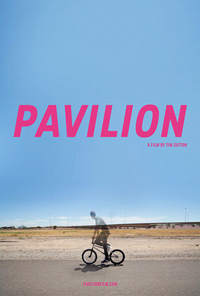Tiny Wins and Losses: Sutton Explores Teenage Life
 At fifteen, your neighborhood is your kingdom. Streets, curbs, lawns are the landscape on which you begin to write your own narrative, to begin making yourself up as you go along. In Tim Sutton’s directorial debut Pavilion, we follow Max, a standoffish, pensive teen, as he ambles around the woods and suburban side streets of upstate New York until he’s uprooted and relocated to live with his father in Arizona. In Pavilion, Sutton quietly watches Max and his friends and though the results are subtle, at times too subtle, they’re more often revealing; the kids often say very little, but in their blank stares they say a lot. He observes the kids and lets them interact freely, lets them be themselves, and in so doing captures the enormity of the tiny wins and losses that make up teenage life.
At fifteen, your neighborhood is your kingdom. Streets, curbs, lawns are the landscape on which you begin to write your own narrative, to begin making yourself up as you go along. In Tim Sutton’s directorial debut Pavilion, we follow Max, a standoffish, pensive teen, as he ambles around the woods and suburban side streets of upstate New York until he’s uprooted and relocated to live with his father in Arizona. In Pavilion, Sutton quietly watches Max and his friends and though the results are subtle, at times too subtle, they’re more often revealing; the kids often say very little, but in their blank stares they say a lot. He observes the kids and lets them interact freely, lets them be themselves, and in so doing captures the enormity of the tiny wins and losses that make up teenage life.
Sutton’s approach is to let Max and his friends roam around, to do what they do, without the constraint of motivation or need; Sutton recognizes that, at fifteen, choices are made based on what seems most fun to do in the moment. Max glides around the neighborhood on his BMX, wanders around the woods with his crush, smokes a joint with an older friend—taking it all in. When he and his friends all go swimming in a nearby lake, the camera comes with them, bobbing in and out of the water, stealing glances of girls’ legs, and of the boys staring at them.
As Pavilion is somewhat light on story, it is anchored in its cinematography, in its means of dramatizing a posture, of two kids chilling, of boredom. DP Chris Dapkins assuredly lets the camera linger, even to wait, for a moment that may or may not come. Often it does, though when it does not, the results are just as surprising. Dapkins makes it feels like Max is always on the precipice of action—spending time alone with a girl, to say or not say something, make a move or not, all those minutes ticking by. But, more often than not, Max thinks better of it and observes instead.
Sutton and Dapkins’ visual approach is accented by Seth Bomse’s meditative, watchful editing. Bomse lets the film breathe and invites us to share the experience with the characters, contemplating a jump from one side of the stream to the other, standing at the window and looking down, watching kids have fun without you, feeling the distance between us and them.
Despite the freedom given to the actors, the documentary approach to fiction filmmaking, Pavilion is presented as a straightforward narrative film. That is why, the decision to break the fourth wall early in the film complicates how to receive and perceive the dramatic action. In the opening minutes, Max and his friend are playing with Nerf guns in a silent, empty house. As Max’s friend creeps around the corner, he’s shot in the eye and promptly drops to the floor, whimpering. Max, clearly not trying to injure his friend/fellow actor, immediately looks at the camera, as if to apologize. The moment does not add a layer but instead confuses the style; this decision is not pushed far enough to integrate itself into the mode of storytelling, it moreover feels like a happy accident that was left in.
Still, Pavilion pops with the boys’ vibrant T-shirts and baseball caps, the lushness of Upstate New York forests, and the expanse of Arizona sunsets. Sutton’s exploration of teenage wanderings reaffirms that small decisions, little gestures, can be made to feel big, to feel like it’s all there is.
Reviewed at the 2012 SXSW Film Festival.


